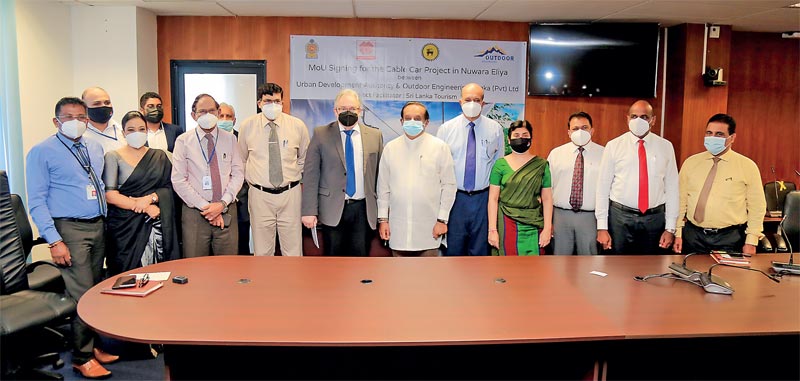Tuesday Feb 24, 2026
Tuesday Feb 24, 2026
Friday, 24 December 2021 02:25 - - {{hitsCtrl.values.hits}}

The last few years have seen a united and consolidated effort on all fronts, aimed at transforming Sri Lanka into a truly contemporary tourism destination. This includes positioning the island as a land of wonder and awe, overflowing with magical experiences, yet offering modern facilities and world-class amenities.
There is also excellent work being done on the ground to ensure the right infrastructure is in place and the island’s countless delights are easily accessible to all visitors. This includes ease of access for the disabled and mobility challenged, as the island strives towards a more inclusive tourism industry.
The most recent project in this spirit is the Cable Car Project, an initiative by the Outdoor Engineering Lanka Ltd., facilitated by the Investor Relations Unit (IRU) of Sri Lanka Tourism Development Authority (SLTDA).
The project which is a first for Sri Lanka will give the island its first cable car experience, which will span a distance of nearly four km. The Cable Car will connect Nanu Oya, a destination made famous due to its strategically located railway station, with Nuwara Eliya town. This, in turn, will provide an alternative and beautifully scenic route between the two locations.
The location chosen for the project takes advantage of the breathtaking scenery and allows visitors a bird’s eye view of the lush green landscape, rolling hills, numerous tea estates, and of course the montane forests of Nuwara Eliya. This new way of locomotion will reduce the direct impact of tourism on nature, while still allowing visitors to observe, interact and enjoy the surroundings with a minimal environmental impact.
The project with an investment value that currently stands at Euro 55 million ($ 62.15 m) will be implemented as a ‘build, own, operate and transfer’ model and thus, this agreement allows the total capital investment to be transferred to the Government of Sri Lanka after a period of 30 years. The project is scheduled to be completed within just 18 months from the date of receiving all approvals.
Outdoor Engineers AG of Switzerland and its local representative, Outdoor Engineering Lanka Ltd. are exponents of the project. Outdoor Engineers AG brings over 30 years of experience in the ropeway industry and has been involved in over 30 cable car installations all over the globe, including the famous Sentosa Cable Car in Singapore.
The cable car equipment will be supplied and installed by partner organisation of Outdoor Engineers AG, Doppelmayr Seilbahnen GmbH of Austria, who is the current world leader in cable car manufacturing and installations, having constructed over 15,100 installations in 96 countries.
The Ropeway system used on the project, has a long history of use in the mountainous regions of Europe and has more recently found wide acceptance around the world. What sets them apart from most other forms of transportation is their ease of use, low environmental impact, and sustainable outlook.
In fact, cable car systems are ideal for the tourism sector as they have minimal impact on the environment, help drastically reduce emissions, and leave behind no harmful emissions or residue. The project will be built according to the highest global safety standards, reliable, and easy to maintain with cost associated with operation and upkeep.
Speaking about this novel and exciting project, Sri Lanka Tourism Chairperson Kimarli Fernando said: “It gives everyone at Sri Lanka Tourism immense pride to be involved in this project, which is indicative of the progressive attitude we have adopted towards the future of the island and its tourism sector. The IRU division of the SLTDA together with the respective line agencies enabled a high level of competency and efficiency in keeping with international construction, safety, environmental, and quality standards. As a result of an effective and healthy collaboration of all line agencies involved, it allowed for complete compliance with all necessary regulatory frameworks, allowing for greater efficiency and transparency.”
The design of the ‘The Cable Car Project’ ensures that it blends seamlessly with the surrounding landscape so as to not distract from the natural setting. Care has also been taken to preserve the tree line, canopy, and other aspects of the wilderness during construction and implementation. It was shown that the implementation of the project would reduce harmful greenhouse emissions by approximately 180 metric tons per year.
As a BOOT project (Build, Own, Operate, Transfer) the operation will create new industries, opportunities, and jobs in the region. This is essential, as Sri Lanka looks to lift the standard of living across the country while providing more new opportunities to rural communities. The project is also indicative of what can be achieved when the many facets of government work together towards a unified vision.
Working closely with Sri Lanka Tourism the UDA signed a MoU with Outdoor Engineering Lanka Ltd. on 9 December to allocate land for this project on a 30-year lease period and did an excellent job clearing the necessary land, while also establishing strict guidelines for its preservation and use. A collective effort of vital Government agencies such as the CEA and Forest Department along with nearly 20 other line agencies were also indispensable to the project’s success.
The project is one of several which are underway, under President Gotabaya Rajapaksa’s ‘Vistas of Prosperity and Splendour’ policy initiative. This is a vital step in the right direction as Sri Lanka positions itself as an exclusive destination, for the high-value experiential traveler. The projects will also bolster the island’s reputation in the eyes of the world, showcasing it as a cosmopolitan destination that has just about everything a world traveler could desire.